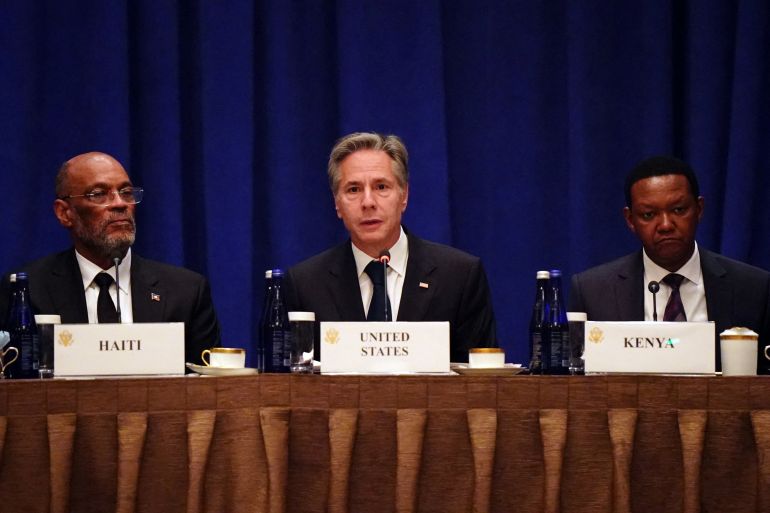US says Haiti security mission could deploy ‘in months’, urges support
Secretary of State Antony Blinken says US ready to provide ‘financial and logistical’ aid to proposed Haiti deployment.

US Secretary of State Antony Blinken has said a Kenya-led, international security mission to Haiti could deploy “in months”, urging the United Nations Security Council to authorise the deployment as soon as possible.
Speaking on Friday morning at a start of a UN meeting in New York on the situation in Haiti, Blinken said the United States would supply “robust financial and logistical assistance” to the proposed mission.
Keep reading
list of 3 itemsUS deports dozens to Haiti despite telling citizens to leave country
Biden urges UN Security Council to authorise international mission to Haiti
“We urge the international community to pledge additional personnel, as well as equipment, logistics, training and funding. We cannot be successful without these contributions,” the top US diplomat said.
“And we strongly urge the Security Council to pass a resolution to authorise this mission … The United States is working with Ecuador to put forward a text,” Blinken added. “With our support, this mission can deploy within months, and we really have no time to lose.”
Haiti has seen a surge in gang violence over the past several years, particularly after the July 2021 assassination of President Jovenel Moise, which created a power vacuum.
Gangs control most of the capital, Port-au-Prince, and armed confrontations have disrupted access to health care and other services, according to the UN and rights observers.
Haitians face a barrage of attacks, including kidnappings for ransom and sexual violence, and thousands have been displaced from their homes.
In October of last year, Haiti’s de facto leader, Prime Minister Ariel Henry, called on the international community to help set up a “specialised armed force” to quell the violence.
The request for an international mission to Haiti enjoyed the backing of the US and the UN, but a deployment has been stalled for months because no country had agreed to lead such a mission to the country.
Several rights activists also have raised questions around the prospect of foreign intervention, saying past missions have brought more harm than good, and called on countries to ensure adequate safeguards are in place.
However, in July, Kenya said it was prepared to lead a “multinational force” in Haiti – provided the mission gets a mandate from the UN Security Council – to help train and assist the Haitian police to “restore normalcy”.
On Friday, Blinken welcomed “the Kenyan government’s willingness to serve as the lead nation in this mission”.
He said the deployment would have three key aims: “Providing operational support to the Haitian National Police to combat the gangs; ensuring static security of key installations and thoroughfares, and strengthening the Haitian National Police for the long-term.”
Blinken also said President Joe Biden’s administration would work with the US Congress to provide $100m to support the mission, and the US Department of Defense was ready to provide “planning assistance, intelligence support, airlift, communications and medical support”.
But he acknowledged that a mission would not serve as a substitute for addressing a political deadlock in Haiti.
Government institutions in the Caribbean nation are largely non-functioning, and Henry – the Haitian prime minister – has delayed elections due to the violence.
“Improved security must be accompanied by real progress to resolve the political crisis,” Blinken said.
In an open letter addressed to Blinken and Biden on Friday, a group of Haitian-American elected lawmakers and officials from across the US said they “strongly oppose” to the prospect of foreign intervention in Haiti.
“Any military intervention supporting Haiti’s corrupt, repressive, unelected regime will likely exacerbate its current political crisis to a catastrophic one,” they wrote (PDF).
“It will further entrench the regime, deepening Haiti’s political crisis while generating significant civilian casualties and migration pressure.”